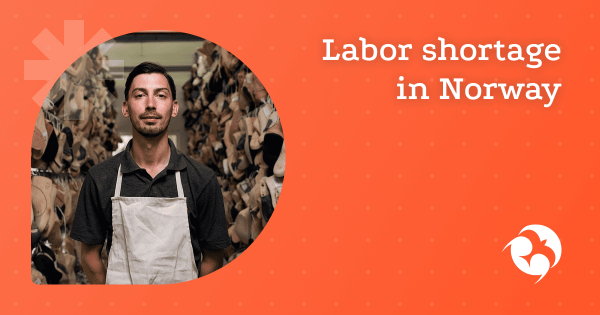Norway has entered the TOP 6 EU countries with the largest number of scarce professions. There is a significant shortage of garbage collectors, kitchen assistants, nurses and specialist doctors, mainly obstetricians.
More than half of all identified deficient professions (53%) now account for only six countries. This list, in addition to Norway, includes Belgium, the Netherlands, Romania, Slovenia and France.
What is the current situation with the workforce in Norway
Norway lacks a workforce in 193 professions, according to a report by EURES last year. The country is very dependent on the influx of foreign specialists from other EU countries.
The most scarce areas and the most scarce professions in them:
- Cleaning: garbage collectors and recycling;
- Cooking: butchers, fishmongers and other food professionals;
- Restaurant business: kitchen assistants, waiters;
- Healthcare: medical practitioners, midwives, nurses, veterinarians, as well as technicians and assistants;
- Construction: operators of cranes, lifts and related installations, floor and tile installers, metalwork assemblers and installers;
- Information technology (IT): employees of the service station, employees of information services of contact centers, system administrators;
- Engineering: Mechanical engineers;
- Field of education: managers in education, Teachers for people with special needs;
- Other professions: security guards, political and strategic managers, people of creative professions (composers, musicians, singers), personnel and career specialists, specialists related to religion.
At the same time, there are also redundant areas in the country where too many people go to work. Due to the oversupply in the labor market, it becomes more difficult for people in these professions to find work.
Redundant professions and fields include:
- Movers;
- Transport cleaning specialists;
- Building guards;
- The field of cosmetology;
- Storekeepers;
- Administrators at the check-in desks;
- Multimedia designers and graphic designers.
What does this mean for digital Nomads
The current situation suggests that foreign workers now have an increased chance of moving to Norway for work. If you work in one of the areas with the greatest shortage of employees, then you have a better chance of getting a job and a work visa to Norway.
Norway is strongly focused on the maintenance and protection of human rights, including labor rights. The country really strives for equality and inclusivity in all spheres, and horizontal governance is developed there without a rigid hierarchy. This is suitable for many young people, adherents of modern values. Norwegians also value work-life balance, and most companies do not accept recycling, which should also be an advantage for foreign workers.
At the same time, Norway has quite high salaries, even in comparison with Central and Northern Europe. In 2024, the average salary in the country is 45,839 Norwegian kroner (approximately $4,600) per month. The cost of living is also quite high, but it is comparable to salaries. For example, the average person in Norway will spend 1,100 euros (NOK 12,981) per month on living and about 812 euros (NOK 9,570) on rental housing (not in the city center).
All the key information about the Norwegian work visa can be found on our website. Be sure to read the article about getting it.






